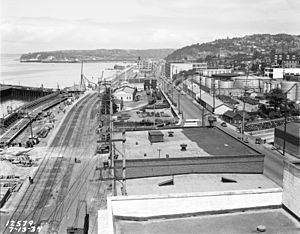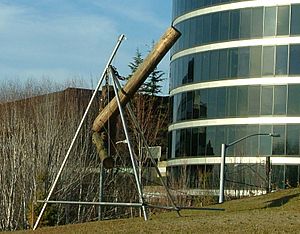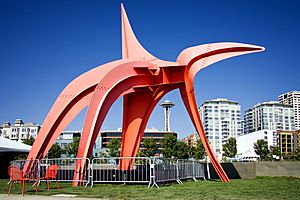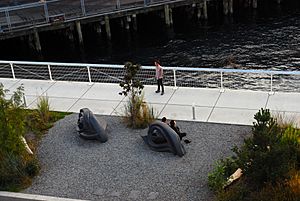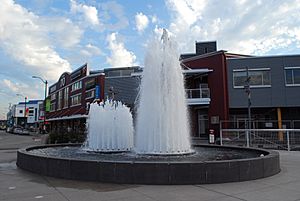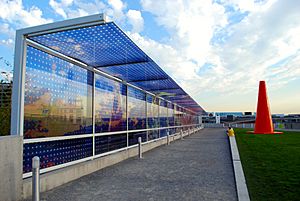Olympic Sculpture Park facts for kids
Quick facts for kids Olympic Sculpture Park |
|
|---|---|
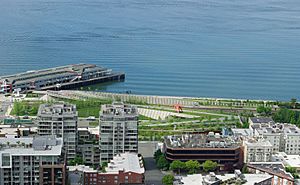
The park as viewed from the Space Needle
|
|
| Type | Sculpture park |
| Location | 2901 Western Avenue Seattle, Washington, U.S. |
| Area | 8.5 acres (3.4 ha) |
| Founder | Mary and Jon Shirley |
| Designer | Weiss/Manfredi |
| Operated by | Seattle Art Museum |
| Open | January 20, 2007 |
| Public transit access | Westlake station (Sound Transit) |
| Other information | Open sunrise to sunset |
The Olympic Sculpture Park is a cool outdoor museum in downtown Seattle, Washington. It's a public park filled with amazing modern and contemporary sculptures. The Seattle Art Museum (SAM) created and runs this special place.
The park first opened its doors on January 20, 2007. It covers about 9 acres, which is like having a huge outdoor art gallery! Besides the sculptures, there's also an indoor building and a beach right on Puget Sound. You can find it in an area called Belltown, near the water.
The Olympic Sculpture Park is free to visit, which is awesome! It has sculptures that are always there, plus some that change over time. The Seattle Art Museum often brings in new, big artworks for people to see. For example, artists like Victoria Haven, Spencer Finch, and Regina Silveira have had their art displayed here.
Contents
How the Park Started
Before it became a beautiful park, this land was used by an oil and gas company until the 1970s. It was a bit of a mess after that, but the Seattle Art Museum had a great idea. They wanted to turn it into one of the only green spaces in Downtown Seattle.
The Big Idea
The idea for a large outdoor sculpture park in Seattle began with some art lovers. Virginia and Bagley Wright, along with Mary and Jon Shirley, talked about it. Jon Shirley was even the head of the Seattle Art Museum at the time! The museum's director, Mimi Gardner Gates, also helped make this dream a reality.
A very generous gift from Mary and Jon Shirley helped get the park built. Part of building the park also involved improving the shoreline. About 1,000 feet of the seawall and underwater area were rebuilt. They created a special underwater slope with big rocks to break waves and a flat area to help sea creatures. This was done to help young salmon from the Duwamish River and test new ways to protect the ocean.
Community Concerns
Before the park was built, some people worried about the Waterfront Streetcar. The park's plans meant tearing down the streetcar's repair building. Even though staff offered to turn the building into a sculpture, it was taken down. The streetcar line closed in November 2005. This streetcar route was very popular with both tourists and local people.
Amazing Artworks
The Olympic Sculpture Park is home to many incredible sculptures. Some are permanent, meaning they stay there all the time, while others are temporary.
Sculptures You Can See Now
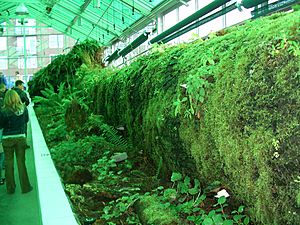
Here are some of the cool sculptures you can find at the park:
- Bunyon's Chess (1965) by Mark di Suvero
- Curve XXIV (1981) by Ellsworth Kelly
- Eagle (1971) by Alexander Calder
- Echo (2011) by Jaume Plensa
- Eye Benches I, II and III (1996) by Louise Bourgeois
- Father and Son (2004–2006) by Louise Bourgeois
- Love & Loss (2005) by Roy McMakin
- Mary's Invitation – A Place to Regard Beauty (2014) by Ginny Ruffner
- Neukom Vivarium (2006) by Mark Dion
- Perre's Ventaglio III (1967) by Beverly Pepper
- Persephone Unbound (1965) by Beverly Pepper
- Schubert Sonata (1992) by Mark di Suvero
- Seattle Cloud Cover (2006) by Teresita Fernández
- Sky Landscape I (1983) by Louise Nevelson
- Split (2003) by Roxy Paine
- Stinger (1999) by Tony Smith
- Two Plane Vertical Horizontal Variation III (1973) by George Rickey
- Untitled (2004–2007) by Roy McMakin
- Wake (2004) by Richard Serra
- Wandering Rocks (1967) by Tony Smith
Past Sculptures
Some artworks have been displayed at the park in the past, including:
- Riviera (1971–1974) by Anthony Caro
- Typewriter Eraser, Scale X by Claes Oldenburg and Coosje van Bruggen
About Stinger
The sculpture Stinger was created by artist Tony Smith after he passed away. He first drew the idea in 1967 and made a wooden model in 1968. The steel version you see at the park was built in 1999, following his original design. It was given to the Seattle Art Museum by his family.
About Typewriter Eraser, Scale X
When the park opened in 2007, the sculpture Typewriter Eraser, Scale X was on loan. It belonged to Microsoft co-founder Paul Allen. At first, visitors weren't allowed to take pictures of this sculpture. But later, the park changed its rules and allowed photos. This sculpture moved to Seattle Center in 2016.
Taking Care of the Art
Keeping the sculptures in good condition is a big job! Since the park is right next to Puget Sound, which is salty water, the environment can be tough on the art. Salt water can cause things to rust or wear down.
For example, Bunyon's Chess is made of wood and metal. It needed special care to fix it up in 2018. The museum has a rule called "no-touch" to help protect the art. This means visitors should not touch the sculptures. Oils from human hands can damage the art over time. This is especially important for Wake by Richard Serra, which has a special rust-colored surface that needs to be protected.
Tall painted sculptures like Eagle need to be checked for damage from birds. Keeping these large artworks clean and repaired is expensive. It often requires special equipment like scaffolding or lifts. The paint on Eagle can also be easily damaged by lawnmowers. So, gardeners have to use scissors to trim the grass near it! In 2020, Eagle got a full makeover with new paint to keep it looking great.
 | Aurelia Browder |
 | Nannie Helen Burroughs |
 | Michelle Alexander |


